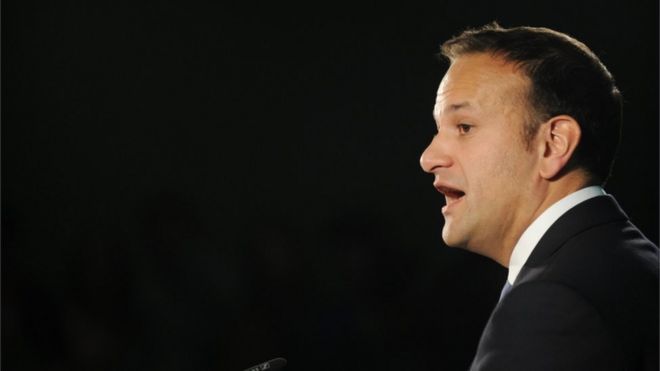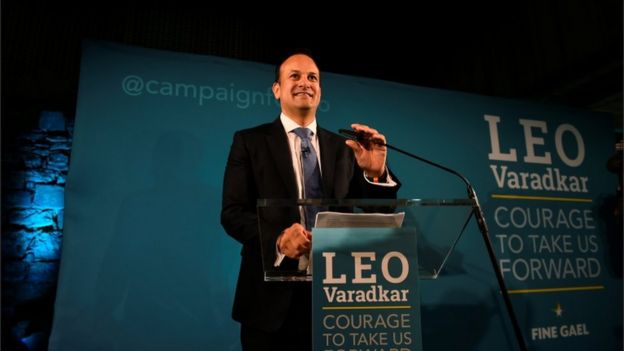
There have been plenty of international headlines about Leo Varadkar's rise to the top of Irish politics.
Almost all focus on the fact that the Republic of Ireland is set to have a half-Indian, openly gay prime minister.Mr Varadkar has come to embody the liberalisation of a country which was once regarded as one of the most socially conservative in Europe.
But, in Ireland, Mr Varadkar's sexuality and ethnic background have not been particularly prominent.
He has won the race for the leadership of Fine Gael - the biggest party in the country's ruling coalition - meaning he is in line to take over as taoiseach (Irish prime minister) in the next few weeks.
The leadership contest focused primarily on socio-economic issues and the defining challenges for Mr Varadkar will be how to build on the Republic of Ireland's recovery from the financial disaster of several years ago, and how to manage Brexit.
Celtic Tiger
Mr Varadkar was born on 18 January 1979 in Dublin.His father Ashok - a doctor from Mumbai - met his mother Miriam, an Irish nurse, while they were both working in Slough in Berkshire.
They settled in Ireland in the 1970s.
The country Mr Varadkar grew up in was very different to today.
Until the 1990s, homosexuality and divorce were illegal.
There were few immigrants, and the Republic of Ireland was one of the poorer members of the EU.
Mr Varadkar followed his father into medicine.
He became a councillor aged 24 and, in 2007, he was elected to the Irish parliament, Dáil Éireann.
'Straight talker'
The so-called Celtic Tiger was a global phenomenon - low corporate tax rates brought massive investment to the Republic of Ireland, which became one of the richest countries in the world.But the economy crashed amidst the worldwide financial crisis - and Ireland had to accept a £71bn international bailout.
In the aftermath, Fine Gael came to power at the head of a coalition in 2011.
Mr Varadkar was appointed minister for transport, tourism and sport - and then health minister.

He has built up a high media profile - descriptions of him as a "sharp-shooter" and "straight-talker" are common.
In 2015, he came out as gay in an interview with the Irish national broadcaster, RTÉ.
He said: "It's not a big deal for me any more. I hope it's not a big deal for anyone else - it shouldn't be."
A few months later, Ireland voted in a referendum to legalise same-sex marriage.
When Enda Kenny announced his retirement as taoiseach and Fine Gael leader, Mr Varadkar's supporters launched a "shock-and-awe" strategy which saw most of the party's parliamentarians endorse him within 48 hours.
His opponent, Housing Minister Simon Coveney, was never able to recover.
Benefit cheats
But he did express "deep concern" at the direction in which his rival would take Fine Gael - suggesting Mr Varadkar's economic policies would pull the party to the right.Mr Varadkar said Fine Gael should represent those "who got up early in the morning".
He went on to say he was talking about "people working in the public and private sector, the self-employed, carers getting up to mind loved ones, parents getting up to mind children".
But Fine Gael's political enemies have tried to portray him as a rightwing ideologue - pointing to a recent campaign against benefits cheats.
Mr Varadkar's predecessor, Mr Kenny, stood down a year after an election result in which Fine Gael lost seats, and could only form a minority government.
When Mr Varadkar is officially installed as premier in the next few weeks he will be, at 38, the country's youngest prime minister.
He will face what Mr Kenny has described as the biggest challenge the Irish state has ever had - the departure of its nearest neighbour from the EU.
But Mr Varadkar has an internationalist outlook - seeing himself in the same mould as the French President Emmanuel Macron or the Canadian Prime Minister Justin Trudeau - a youthful, dynamic, centrist leader.
His potent political brand has taken him far- but his toughest tests are still to come.
0 comments: